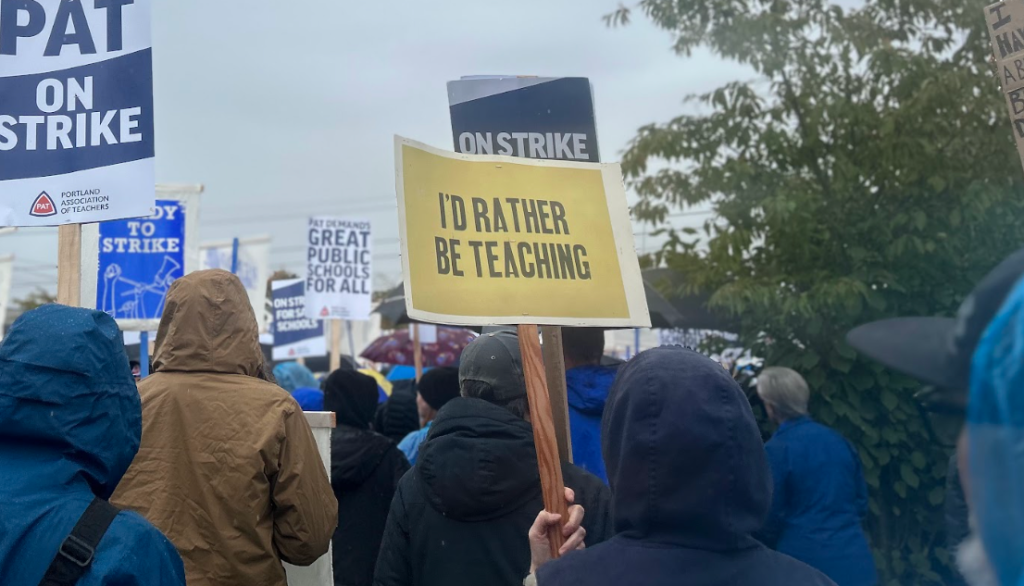Oregon lawmakers scale back proposal for unemployment strike payments amid blowback
Published 7:00 am Thursday, June 12, 2025

- Hundreds of educators, parents and students joined a rally Nov. 1. 2023 at Roosevelt High School in north Portland to support striking teachers. Teachers like them could soon receive up to 10 weeks of unemployment benefits under a compromise negotiated by Oregon lawmakers.(Alex Baumhardt/Oregon Capital Chronicle)
A watered-down bill extending unemployment benefits to striking public and private employees will need to once again clear both legislative chambers after a concurrence vote
A particularly controversial measure that would give unemployment benefits to public and private Oregon workers during labor strikes survived a key Wednesday hearing after lawmakers agreed to cut the length of time in which workers on strike could cash checks by more than half.
Senate Bill 916 would have limited striking workers to receiving benefits for 26 weeks, in line with the current caps on unemployment checks for Oregonians. But after the Senate rejected an amended version of the bill on Tuesday, a bicameral conference committee voted Wednesday to set a new cutoff at 10 weeks after a two-week waiting period. Committee members voted along party lines, with the sole Republican present voting against the amendments.
Trending
“I do feel like this is a massive compromise,” said Rep. Dacia Grayber, D-Portland, the bill’s lead author. “It’s not something I’m entirely thrilled with.”
The measure would be a first-in-the-nation move by Oregon, establishing a right to strike for public and private employees while ensuring them the ability to apply for unemployment benefits. Aside from traditionally strike-exempt public employees such as firefighters and police, workers such as nurses and teachers could claim benefits after two weeks of striking.
The bill has been among this session’s most controversial measures, laying bare deep divisions over how best to use the state’s $6.4 billion unemployment insurance fund. The changes come after support for a Democrat-led bill collapsed in a concurring Senate vote on Tuesday amid concerns from Republicans and a key dissenting Democrat. It had already drawn opposition from school board leaders who help negotiate teacher strikes, business groups, and local government leaders who contribute to the state’s unemployment fund.
“We have a healthy fund today due in no small part because all the agreements in the years have been honored,” committee member Sen. Daniel Bonham, R- The Dalles, told his colleagues before voting against the amended bill. “It is a healthy enough fund that I don’t know that this will be a massive draw on it, but again the kids will lose if teachers are incentivized to strike.”
House Democrats got the bill over the finish line in their chamber last week, arguing that the benefits would be used sparingly and not as a tool to prolong strikes, but to shorten them. A change made in a House committee would cap benefits to eight weeks if the state’s unemployment fund is at risk, and lawmakers also included an amendment that mandates deductions in backpay for benefits claimed by teachers during strikes.
Grayber repeated a promise she has made to continue monitoring the bill’s implementation if it were to pass, but also signaled that she hoped to move past concerns that the bill would promote misuse of the unemployment system or dramatically hamper school life and public facilities.
Trending
She said she’s been “guided by the math” behind the bill from the beginning, a subtle nod to the estimates from the state’s employment department that the bill would not change existing tax structures for businesses and government agencies paying into the state’s unemployment funding.
“I have heard the opposition,” she said. “I very much look forward to moving past what feels like a worst-case scenario focus that we’ve maintained for several weeks now.”
Oregonians who have lost a job can currently apply for unemployment weekly checks ranging from $196 to $836. The bill would allow benefits to kick in immediately if workers are locked out of facilities by their employer during negotiations.
Sen. Mark Meek, D-Gladstone, is a sponsor of the legislation, but withdrew his support when it came up short in a 15-14 Senate vote on Tuesday. In a brief interview after the hearing, he declined to comment on whether he supported the proposed changes. He referred to another attempt at a transportation and infrastructure funding bill that the Legislature has taken up in the final weeks of the session: “If there’s time to pass a transportation package, there’s time to get this right,” he said.
The new amendment pushes the bill closer to a similar law passed in Washington that caps benefits at six weeks, but which doesn’t go so far as to protect public employees like Oregon’s proposed legislation. New Jersey and New York have also passed laws in recent years to provide unemployment benefits to striking private sector workers, and California Gov. Gavin Newsom vetoed a similar effort in 2023 over fiscal concerns.
Another bill extending benefits to striking workers in Connecticut is currently sitting on Gov. Ned Lamont’s desk, but he is expected to veto it. The bill passed out of committee on a 4-1 vote. Rep. Lucetta Elmer, R-McMinnville, was excused.








